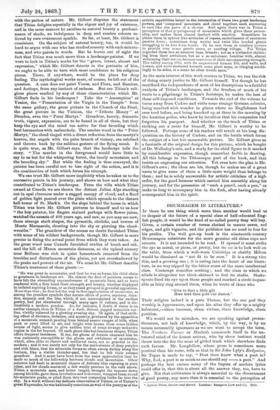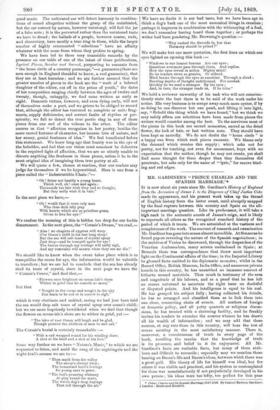BRUMMAGEM IN LITERATURE.*
IF there be one thing which more than another would lead us to despair of the future of a special class of half-educated Eng- lish people, it would be the kind of so-called poetry they will buy. Given, a certain number of verses clothed in mauve cover, red edges, and gilt vignette, and the publisher has no need to fear for his profits. The well got-up book is the nineteenth-century Brummagem substitute for the more genuine old china cups and saucers. It is not intended to be read. If opened it must strike the eye as moral, or pious, or pretty, but its use is to look well on the table, from which a well-worn Coleridge or shabby Milton would be dismissed as "not fit to be seen." It is a strong vice this, and a growing one ; it is eating into the heart of our litera- ture, in no way nipped by the bitter scorn of the more intellectual class. Contempt remedies nothing ; and the class to which we allude is altogether too thick-skinned to feel its shafts. Shake- speare fixed his eye upon these people and marked a circle impass- able as fairy ring around them, when he wrote of those who
"Give to dust a little gilt
More laud than gold o'er dusted."
Their religion indeed is a pure Theism, but the one god they worship is Appearance, and upon his altar they offer up a mighty holocaust,—sham incomes, sham virtues, sham knowledge, sham position.
We would not be mistaken, we are speaking against preten- tiousness, not lack of knowledge, which, by the way, is by no means necessarily ignorance as we are wont to accept the term. The Northern Farmer or Macbeth commends itself to the un- tutored mind of the honest artizan, who by sheer instinct would throw into the fire the mass of gilded trash which elsewhere finds such favour. Mr. Longfellow, whose prose is sometimes more poetical than his verse, tells us that in Sir John Lyly's Endymion, Sir Topes is made to say, "Post thou know what a poet is? Why, fool, a poet is as much as one should say — a poet." And perhaps the best excuse many of the buyers of modern lyrics could offer is, that this is about all the answer they, too, have to give. Not that cultivation is always essential to the discernment of good poetry, any more than it is essential to the perception of
* Lyrical Pieces, Secular mut Sacred. London: Sampson Low and Co. 1869.
good music. The cultivated ear will detect harmony in combina- tions of sound altogether without the grasp of the uninitiated, but the ear correct by nature, however untutorO, will feel the jar of a false note ; it is the perverted rather than the untutored taste we have to dread ; the ballads of a people, however coarse, rude, and elementary, have mostly a true ring in them, while the larger number of highly ornamented " selections " have no affinity whatever with the muse from whom they profess to spring.
We have been led to these very unamiable remarks by the presence on .our table of one of the latest of these publications, Lyrical Pieces, Secular and Sacred, purporting to emanate from "the home circle of a country parsonage,"—a guarantee (there are men enough in England thankful to know, a real guarantee), that they are at least harmless ; and we are further assured that the greater number of pieces in the book are the "work of a beloved daughter of the editor, cut off in the prime of youth," the dates of her composition ranging chiefly between the ages of twelve and twenty, though, unhappily, we find some written as early as eight. Domestic virtues, however, and even dying early, will not of themselves make a poet, and we grieve to be obliged to record that, although the editor has ventured to complete or unite frag- ments, supply deficiencies, and correct faults of rhythm or per- spicuity, we fail to detect the true poetic ring in any of these pieces from one end of the volume to the other. The editor assures us that "affection recognizes in her poetry, besides the more sacred features of character, her intense love of nature, and her sunny, genial freshness of idea." We feel humiliated before this statement. We knew long ago that beauty was in the eye of the beholder, and feel that our vision must somehow be defective in the required light of affection, that we are so utterly unable to discern anything like freshness in these pieces, unless it be in the most original idea of imagining them true poetry at all.
We will quote a few, chosen at random, that our readers may judge for themselves if we be hypercritical. Here is one from a piece called the "Indestructible Chain :"—
" Oh ! fetter not hastily a young heart, Think well, oh! once and again;
Thousands too late wish they had so thought, But they sadly wish it in vain."
In the next piece we have,— " Oh ! would that it were only man Who thus doth idly play With hearts which are as priceless gems,
Given to live for aye !"
We confess the meaning of this is hidden too deep for our feeble discernment. In the next piece, the" Corsair's Dream," we read,—
" Alas ! no chaplets of cypress will weep
O'er Ocean's child in his last long sleep!
But the sea will salt tears of crystal spray Just drop—and be tranquil again for aye!
The breeze through my cordage will sadly sigh,
And my comrades will mourn when they see me dio !"
We should like to know when the event takes place which is to tranquillize the ocean for aye, the information would be valuable to travellers ; but we are led to conclude that the sea has already shed its tears of crystal, since in the next page we have the "Corsair's Grave," and find that,— "Flowers once brightest on ocean-isle's shore Wither in grief that he cometh no more,"
but that
"Nought in the ocean and nought in the sky Can learn to be sad or in sorrow to sigh,"
which is very obstinate and unkind, seeing we had just been told the sea would drop salt tears of crystal spray over ocean's child ; but we are more hopelessly bewildered when we find that though the flowers on ocean-isle's shore are to wither in grief, yet :—
"The isles of vast Ocean will laugh and be glad, Though pensive the children of men be and sad."
The Corsair's burial is certainly remarkable :— "With a sail wrapped round for his winding sheet, A shot at his head and a shot at his feet."
Some way further on we have "Nature's Music," to which we are requested to listen, and amid the song of the nightingale and the night fowl's scream we are to :—
"Then mark from the valley
The sheep's distant bleat; The homeward herd's lowings Its young ones to greet. "The foal's prancing whinney At play round the mare, The watch-dog's deep bayings That roll through the air."
We have no doubt it is our bad taste, but we have been apt to think a dog's bark one of the most unmusical things in creation ; perhaps it improves in combination with the whinneying of a foal, we don't remember having heard them together ; or perhaps the writer had been pondering Mr. Browning's question :—
"Why rushed the discords in, but that Harmony should be prized?"
We will make but one more quotation, the first lines on which our eyes lighted on opening this book :—
"Windows to our inmost bosoms Are our eyes ;
Questions evermore pass through them, And replies.
How the eyes reveal in action Mighty mind!
Be its texture stern as granite, Or refined.
Mind beams through the eyes as sunshine Through a cloud ;
Showing depths of thought unfathomed, Not avowed.
Quickly do we read a stranger By his eyes ; And, in turn, the stranger reads 111; If he tries."
We hold a reviewer unworthy of his task who will not conscien- tiously state the best there is to be said of the work under his notice. His very business is to scrape away much mere oyster, if by so doing he can discover but one pearl, and lifting it into light, say, "Behold this thing which we have found," but we think we may safely affirm our selections have been made from pieces the writers would consider among the best. To the survivors most of the pieces in this book are sacred mementos, sacred as the dried flower, the lock of hair, or last written note. They should have been kept as sacredly. We do not doubt the "home circle" is a happy one from which such pieces emanate. We blame only the demand which creates this supply ; which asks not for poetry, not for teaching, not even for amusement, buys with no, expectation that the author, though he may not create, yet shall find some thought for them deeper than they themselves did penetrate, but asks only for the name of "lyric," for mauve bind- ing and red edges.































 Previous page
Previous page